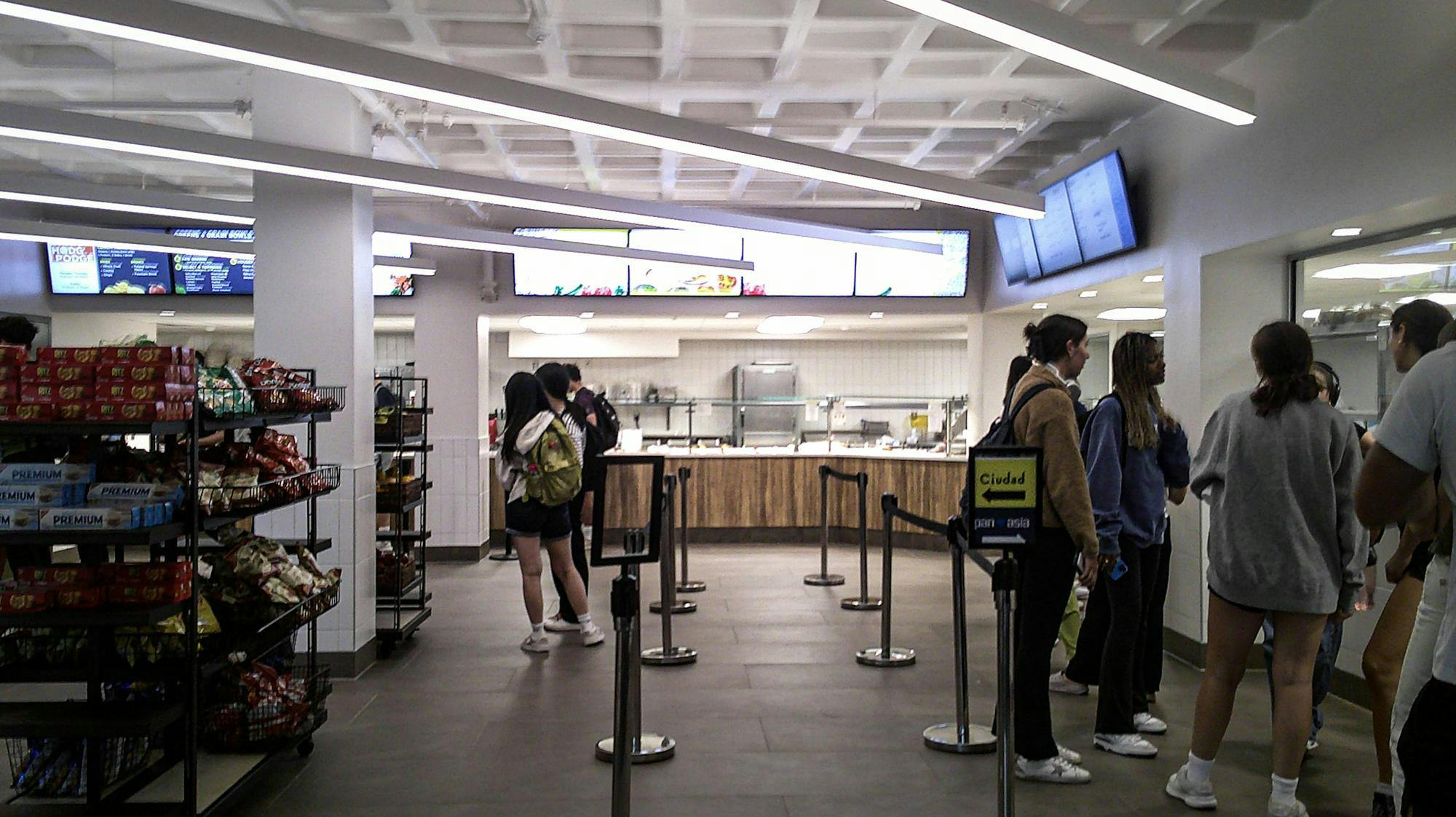In recent weeks, students purchasing food from Hodgdon Food-on-the-Run will have noticed the dining location’s line layout appears to have undergone a subtle redesign and that customers now receive a paper receipt upon checking out. Often, a watchful employee stands near the door.
Patti Klos, director of dining and business services, said that heightened security measures have been implemented in order to address a significant increase in theft. While stealing has always been an issue at Hodgdon, Klos confirmed the recent surge has primarily targeted burrito bowls and retail snacks. She said that in some cases, there had been reports of more than 50 people stealing in a single day.
“It happened fairly suddenly and in very large numbers,” she said of the trend.
Additional food stands and rope stanchions in the middle of the room have been introduced to divide the checkout queue and food lines into two separate spaces, with receipts letting workers visually confirm that students have paid for their food as they leave.
The trend is likely because of the dining location’s renovated floor plan, first-year and Hodgdon student worker Harshit Pal said. Before being renovated in 2023, a physical bottleneck in Hodgdon forced students to pass by cashiers before exiting the building. With renovations, the more open floor plan has inadvertently made it easier for students to leave unnoticed without paying for their food.
“With our new layout, we intentionally wanted to open up the floor to make circulation easier,” Klos said. “[We] never expected that a Tufts student would feel as if they could just walk past the register and not pay.”
The convergence of food lines and the cash register line often causes confusion and facilitates unnoticed exits without payment, a problem worsened by rush hours, Pal said.
“You don’t know who’s where, you don’t know whose order you’re taking, [you’re] calling out at random … that just happens when it’s really busy,” Pal said.
Speaking with the Daily under terms of anonymity out of fear of repercussions, a student who has stolen from Hodgdon in the past corroborated this confusion. She said that dinner hours were particularly conducive to theft due to how busy it gets, allowing her to either slip out with her food or simply eat it while in line.
The student, who said that many of her friends also stole at Hodgdon, pointed to a norm of stealing at Tufts and its lack of consequences. Pal agreed, citing the blatant manner in which students stole.
“What are they gonna do? I’m [already] paying for all this,” Pal explained of students’ mentality. “People got so comfortable with [stealing], and they weren’t getting cracked down on.”
Pal believes that the minor adjustments to the popular dining location have proven to be efficient solutions for streamlining service and ensuring greater student accountability. The changes are part of a larger effort to crack down on student theft at retail locations like Hodgdon. Previously, students who were caught stealing were merely given a warning, but will now face the risk of being reported to the Dean of Student Affairs. These confrontations are handled by the managers of Hodgdon, as to not put regular workers in uncomfortable positions.
The anonymous student acknowledged the effectiveness of these measures in dissuading her from stealing.
“I think it’s just not really worth the risk,” she said. “It also reminds you that it’s affecting someone because if they’re implementing a measure, there’s a reason why.”
Klos said that while they don’t want to punish students, the staff are also responsible for keeping track of inventory of both what food they produce and what food they sell.
“Most of you are using your meal plan, which you’ve already paid for, so we want to be able to account for the food that is distributed,” Klos said. “We think it’s reasonable to ask you to pay for it.”
Pal understood the desire to steal, acknowledging his frustration at the overturned meal swipe policy that allowed students to use their meal swipes twice per period at any dining location, including retail ones like Hodgdon.
“But it’s just decency at that point not to steal,” he said.
But because the uptick happened in recent weeks, Kloss does not believe that the two are directly related. She does, however, acknowledge students’ dissatisfaction about the change last fall, and is meeting with the Tufts Community Union Senate to find solutions to increase food access.
“I’m interested in whether or not the way we manage the plans currently are best meeting students’ needs,” she said. “And I suspect there are some changes that we could make that could better meet them.”
For solutions, Klos suggested keeping locations open longer to give students access later in the day and introducing more service with additional access points, such as with robotics or smart fridges. According to Klos, these ideas are still in the works, but have been successfully implemented at other colleges.
But while seeking better ways to meet students’ needs, Klos maintained her zero-tolerance policy for stealing.
“We’re sensitive about the costs, even though they’re high. We are aware of the impact of that. And so we do our best to manage within that and provide as much access as we can,” she said.
“But to just walk out without paying for food? That’s not justification for anything, as far as I’m concerned.”






